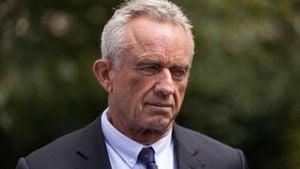The UK government is making headlines with its recent budget plans, particularly focusing on the pressing issue of school funding. Chancellor Rachel Reeves recently committed to providing £1.4 billion to tackle the deterioration of school buildings, stating the aim is to rebuild no less than 50 schools each year. This pledge is seen as necessary, especially as many students are currently learning in classrooms described as "crumbling" and unfit for modern education.
On the eve of the autumn Budget, Reeves highlighted the importance of safeguarding education funding, particularly as headteachers' unions have clamored for more financial support for school infrastructures. Their concerns stem from the revealed delays within the School Rebuilding Programme, where only 23 out of over 500 planned schools have been completed. "The government’s delay on this is unacceptable," said Paul Whiteman, general secretary of the National Association of Head Teachers. He calls for greater transparency and clarity on what "protecting" education funding will entail.
Budget plans are also set to include significant expansions to childcare, with £1.8 billion earmarked for early years services and enhancements to breakfast clubs across primary schools. Reeves emphasized these initiatives will change the educational support structure for young families, helping to broaden accessibility and reduce economic strain on parents. Yet the mood isn’t uniformly optimistic; Labour warns of difficult financial decisions, hinting at potential tax increases and spending cuts up to £40 billion.
Critics are questioning whether the new funding is enough to rectify the widespread issues facing the School Rebuilding Programme, which has faced scrutiny for not meeting its contracting targets. A recent BBC investigation uncovered the Department for Education (DfE) had previously projected 83 contracts to be awarded by March 2023, but as of mid-2024, only 62 had been issued.
Another layer of complexity emerges with the looming changes to VAT on private school fees. The headteacher of one of Edinburgh's premier private institutions raised alarm bells over the government's proposal to impose VAT on fees—a move seen as existential for many independent schools. Anthony Simpson, principal of Erskine Stewart’s Melville School, echoed fears from parents who find themselves anxious about potential tuition hikes once VAT is applied, which is expected to raise around £1.5 billion per year for the UK government.
Despite reassurances from the government, parents remain skeptical. Jane Gilchrist, who removed her children from the state sector to find smaller classes and more support for dyslexia, now faces increased costs of around £8,000 due to the VAT changes. She argues the proposal is not straightforwardly beneficial for families, warning against unintended consequences. “The money can’t be spent twice,” she pointedly remarked during her discussion about financial juggling as education expenses mount.
Education researcher Barry Black from the University of Glasgow supported the VAT change, framing it as necessary for ensuring resources reach state education sectors where they are desperately needed. He contends this policy would redistribute wealth more equitably, allowing for enhanced student support across the board. The sentiment is echoed broadly, with polls indicating general public support for the taxation shifts but mixed responses among parents currently enrolled at private institutions.
While the government’s budget decisions are aimed at improving public education, they are also perceived as severe by some segments of society. The proposals, along with the anticipated announcements about tax adjustments, signal tough times potentially ahead for many households. Creating the optimal educational environment is no small task—both financially and structurally—so it remains to be seen how effectively the government can implement these ambitious plans.
Seeing through the lens of these budget zeniths, the struggle for consistent, high-quality education funding reflects larger economic themes and issues. The government’s dual strategy of boosting spending on school rebuilds and enhancing childcare services hopes to create stability within the education sector at large, yet experts stress the need for clarity on what this can realistically achieve. Ensuring students learn within safe, supportive environments must remain at the forefront as the debates continue surrounding public spending and taxation policies.



